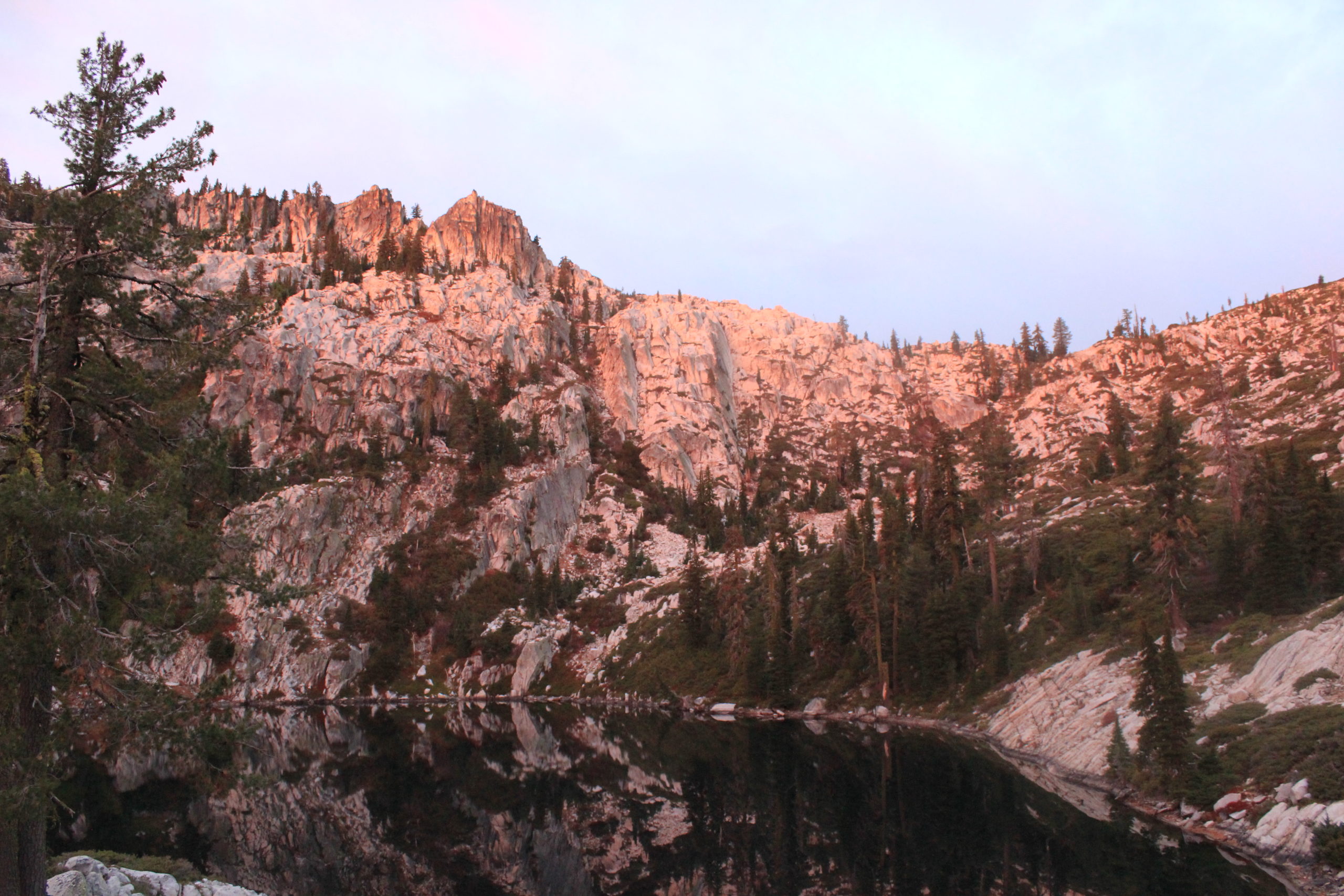“Life is a process of becoming, a combination of states we have to go through.
Where people fail is that they wish to elect a state and remain in it.
This is a kind of death.”
— Anais Nin
I suffered through another long, crappy night tossing and turning without sleep. I could usually doze off and on through summer nights, but the long, chilly autumn nights were challenging, indeed. As soon as I could peer through the dim veil of dawn, I escaped from my nylon torture chamber. I only used it to keep warm, anyway. The translucent sky made it hard to discern any details, but it appeared to be gray and overcast. As the light increased, I saw some cruddy clouds creeping in from the west. They didn’t even have the decency to look pretty. Then a surprise! The angle of the rising sun turned all of Altamira an intense shade of rosy pink! From end to end, the entire south-facing wall of Little Bear Lake was awash in a fuchsia glow. Breathlessly, I grabbed my camera and hustled up to the top of White Bear Rock, scaling the sheer sides like a baboon, but the phenomenon had faded by the time I got there. Damn, that was fast! The rosy hue still lingered on the rocks and treetops, so I found other vantage points for pics as the early morning sun peeked through a small crack under the lid of the clouds, and then all was gray – but not gloomy. The debris of clouds that now covered the sky were consistent with the weather reports – weak and unlikely to rain. Still, I had already made the decision to return home, and I intended to enjoy my last morning in the bosom of the mountains. The sun had probably climbed above the rim to the east, and should have been warming me as I sat on a rock and gazed out at the lake, but the clouds were just too dense, and it remained cold and uninviting. Occasionally, a ray broke through and moved around slowly, like a searchlight seeking survivors… but they never found me.
It’s amazing how quickly the seasons change in the mountains. After a relatively short summer, the days become shorter until the equinox, after which the change accelerates and autumn comes and goes like fake news, yielding inexorably to winter’s icy grip. I have often wondered what it looks like up here in the dead of winter, and I’ve seen a few tantalizing photos. It must be difficult route-finding when rocks and crevices are covered in snow. The way up to Big Bear Lake wouldn’t be too bad – I’ve heard it’s a popular winter hike among locals – but there are quite a few spots on the exposed route to the upper lakes that would be dicey! I ambled around the many camping spots, wondering what I’d bring home from this trip… aside from smelly gear and bits of litter I have collected. Some new camping tricks made it into my bag. I found that a down jacket stuffed entirely into one of its own arms makes a superb pillow in the shape of a sausage. I’ve learned to be more careful with the pee bag in the tent at night (yuck). I’ve discovered some amazing differences in the foliage this late in the year, and the value of packing warm clothes. On a much bigger scale, I have reaffirmed my place in the universe, and reconnected with the awareness that I’m okay, and everything is pretty much unfolding just as it should. Even if human society is on a Kamikaze mission of self-gratification, I can still choose to be at peace, and be thankful for the struggles.
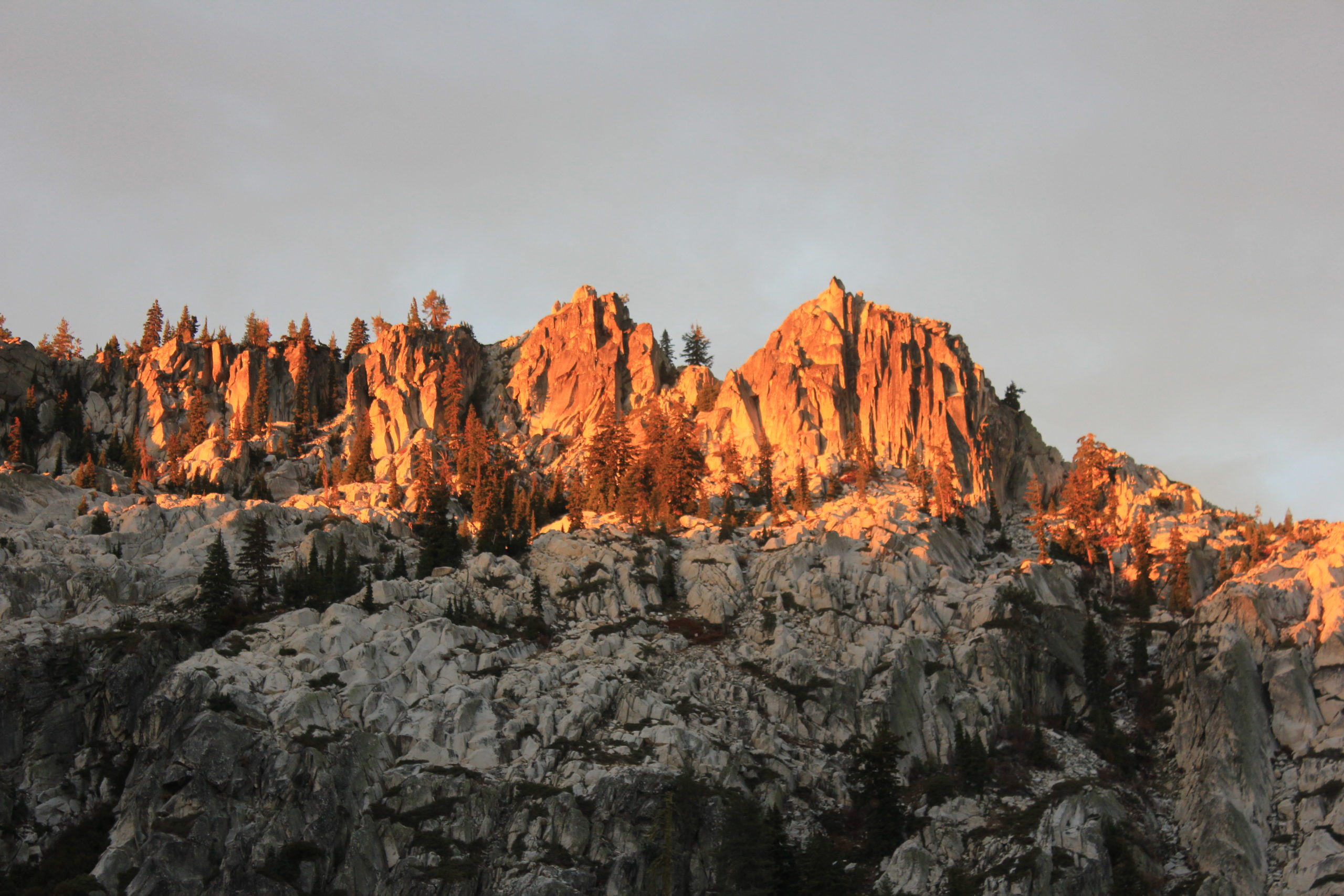

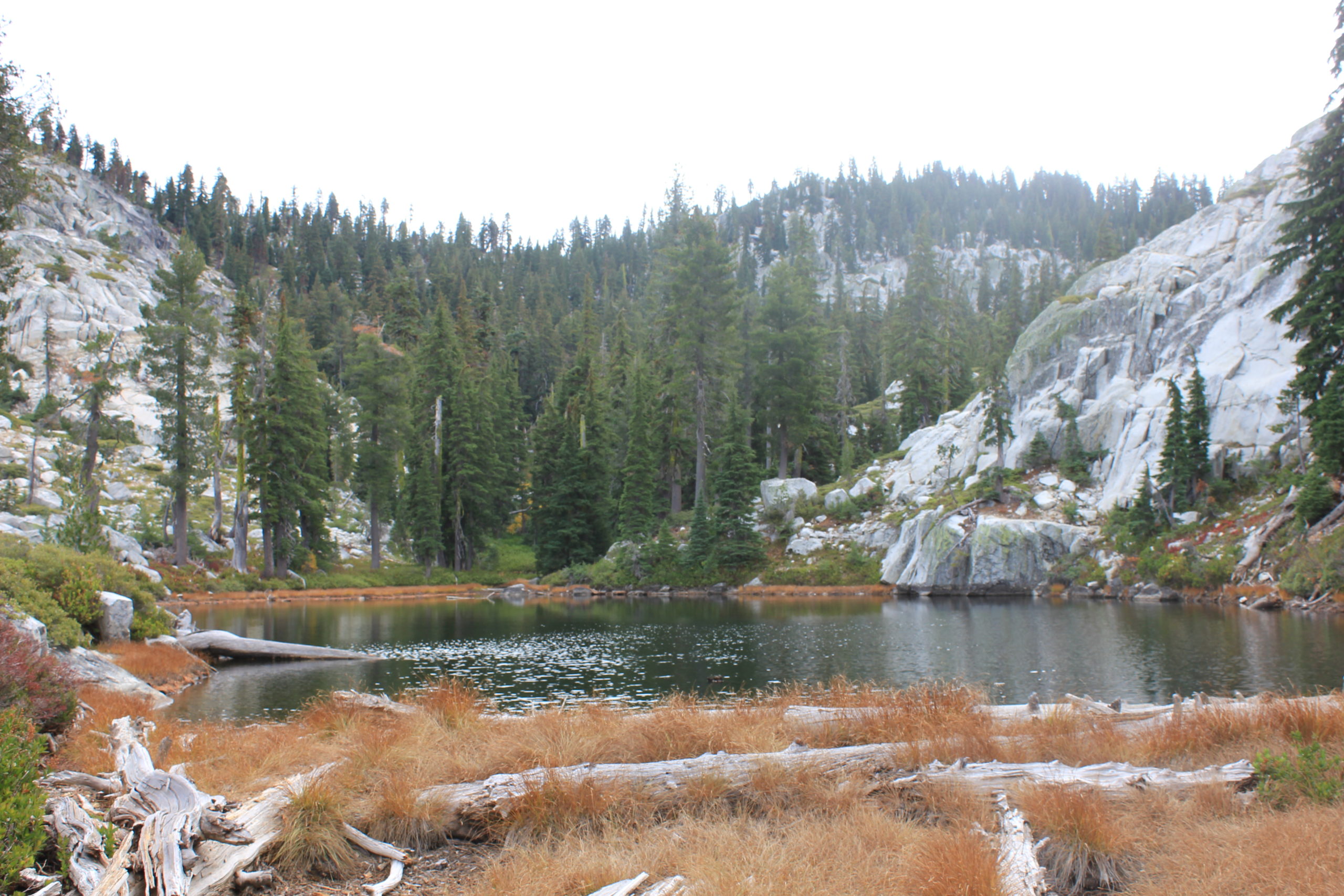
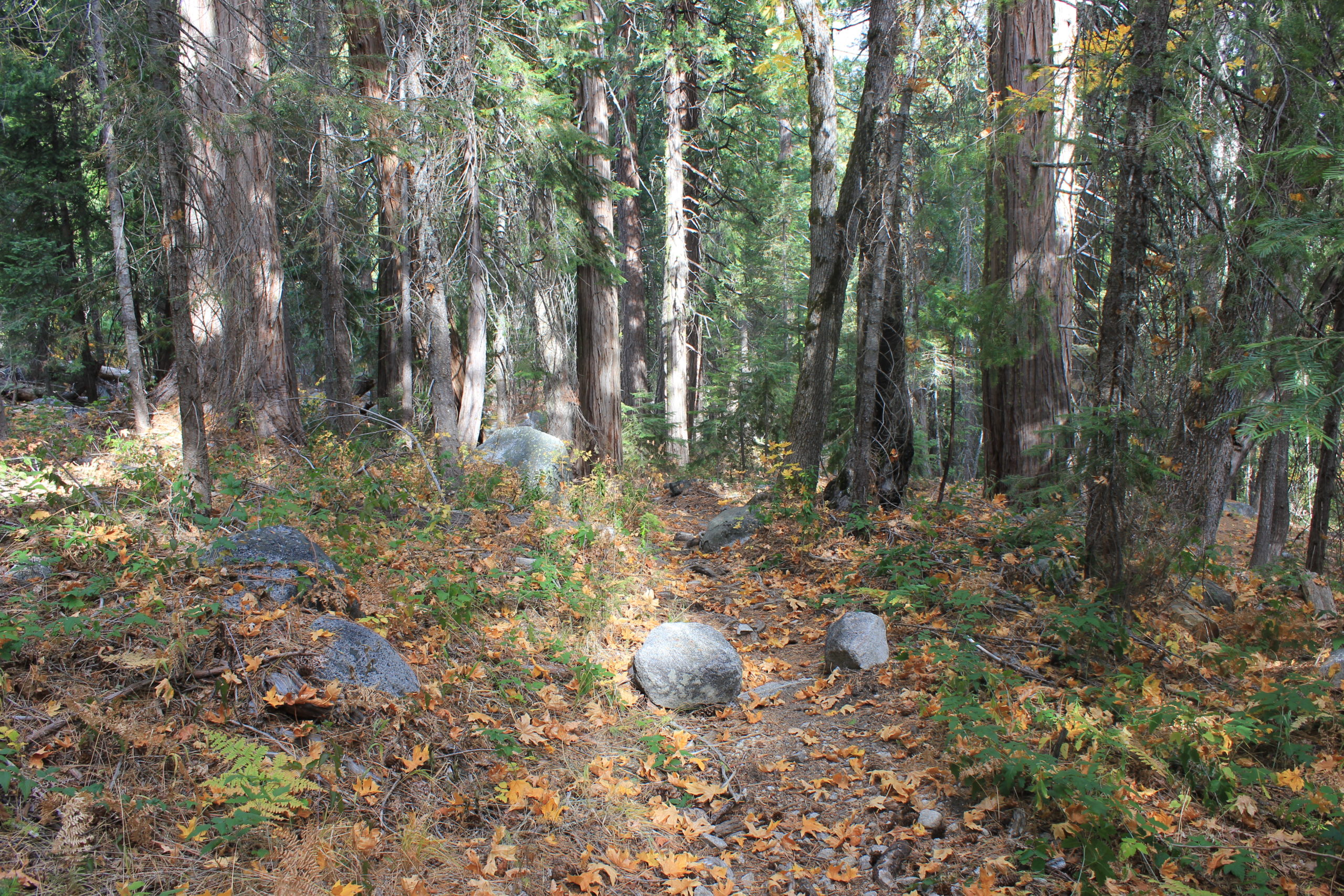
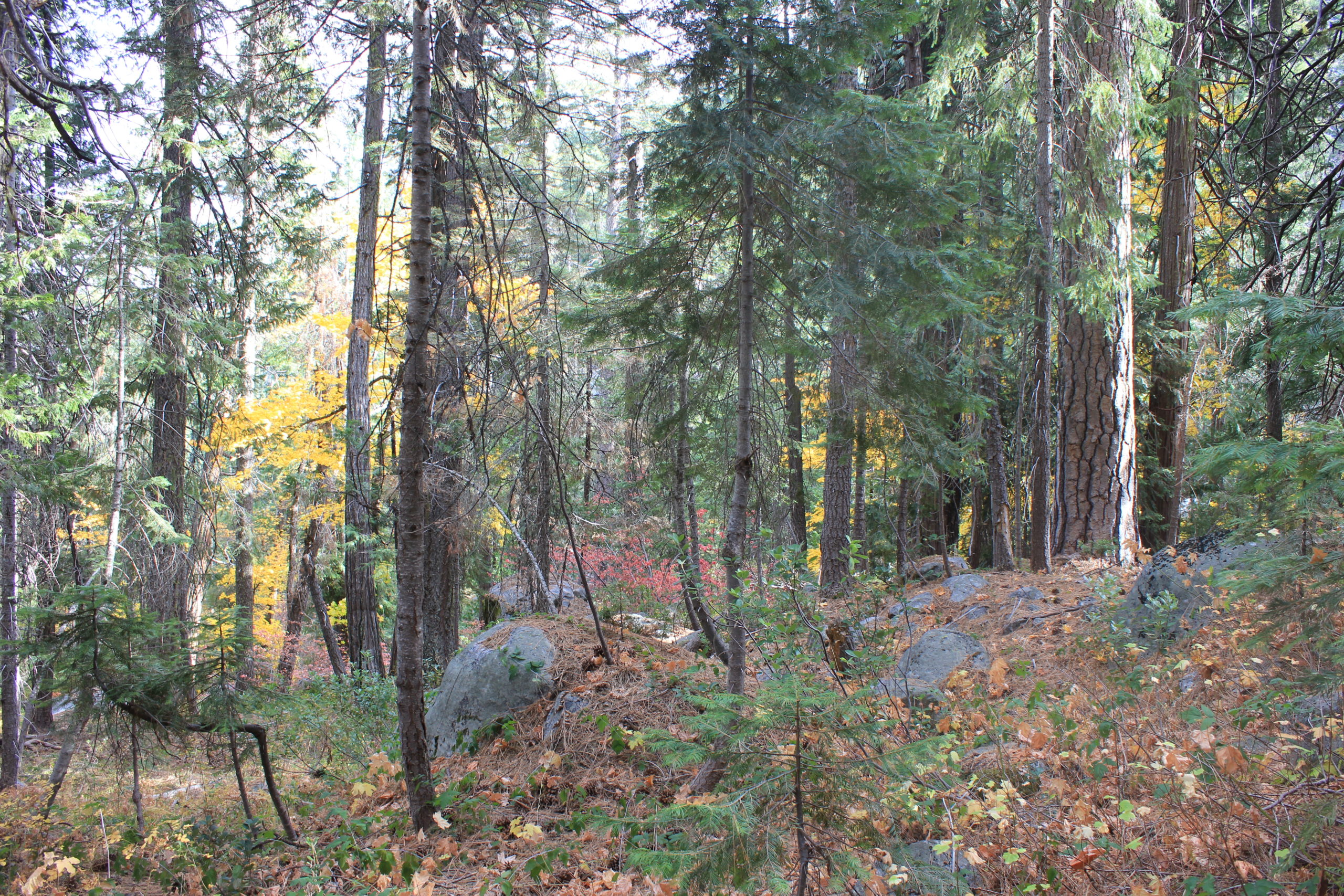
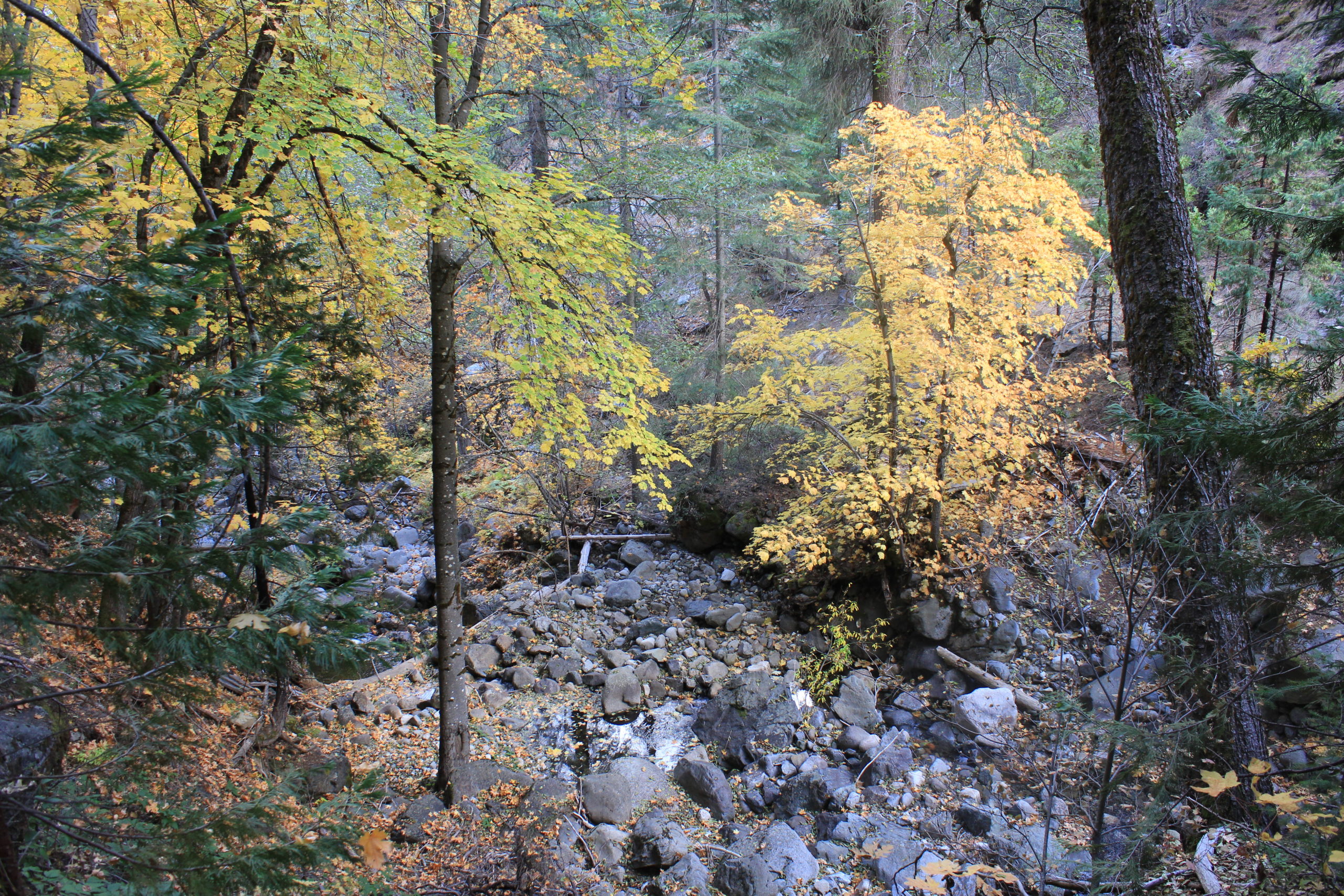
I had another MacGyver moment on this trip. Last year it was a simple cork for my water bottle, but this year I had a much more serious mechanical failure. The sole of my right boot separated from the toe, and gradually got worse, until it was floppy and a dangerous trip hazard – especially downhill – when it got folded backwards under my foot. Cutting it off would destroy the sole. I glued the stupid thing last year (which was why I forgot my boots on that trip), but the shoe goo didn’t hold well. It appeared that this would be the last hike for my old, comfy, lightweight boots. But how could I fix this problem, so I could get home? I had no glue, or duct tape. I thought of wrapping it with the ankle tape I brought, but that would wear through quickly on all the rough rocks. Then I thought of making a wire loop through the front, by piercing the toe with my knife, and pushing the wire upwards through the sole. But I had no wire, and there were no nearby hardware stores, either. “God, what am I going to do?” No sooner had I uttered this out loud, than my eyes were drawn to a perfect, bendable wire about 2 inches long… right next to where I was sitting! A half inch broke off when I tested it, but the rest of it worked perfectly – it even had a little J-shaped hook on the end already! It was as if my need had manifested the object right before my eyes! I silently prayed the Rosary in humble gratitude as I mended my wheels for the all-important trek home.
After breakfast, I finally checked the cave at Baggins End – still no sign of anyone else finding it. That granite Hobbit hole in autumn was more like a walk-in freezer! Maybe it’s not such a great year-round shelter, but it could be fixed up and insulated some. After all, people have been living in caves for many thousands of years, so it can’t be impossible. Then I creatively scaled the rocky bluff by a different route, to watch the sky for weather changes. It was pretty unstable on my getaway day: cold and gray with a chance of showers at any time. The basin had only weak clouds overhead, but there were some surly thugs up to the north behind Sawtooth. I sauntered back into Lothlorien, walking slowly and planning my route, enjoying the primal wildness of the mountain forest. I found myself drawn to the knobs of granite high up on the ridge, and I zig-zagged my way ever upward until I reached their base. It was incredibly broken and wild up there, with boulders tumbled down and trees stubbornly resisting their onslaught, thrusting resolutely from the meager, slanted soil like fish hooks stuck in the lip of a trout. It was a playground for raucous spirits and raptors; but not for man. Taking great care to avoid a last-day injury, I carefully picked my way back down and visited the astonishing Elf Camp exhibit, made of white rocks placed just so. Then I strolled back to my own “man camp” to plan my leaving. It was still cold and gray, with no promise of improving. I decided to have some hot soup and jerky for lunch, then it would be time to bid farewell to my sacred cathedral. But first I’d pick up a last few bits of litter; the better to remove all traces of heretics.
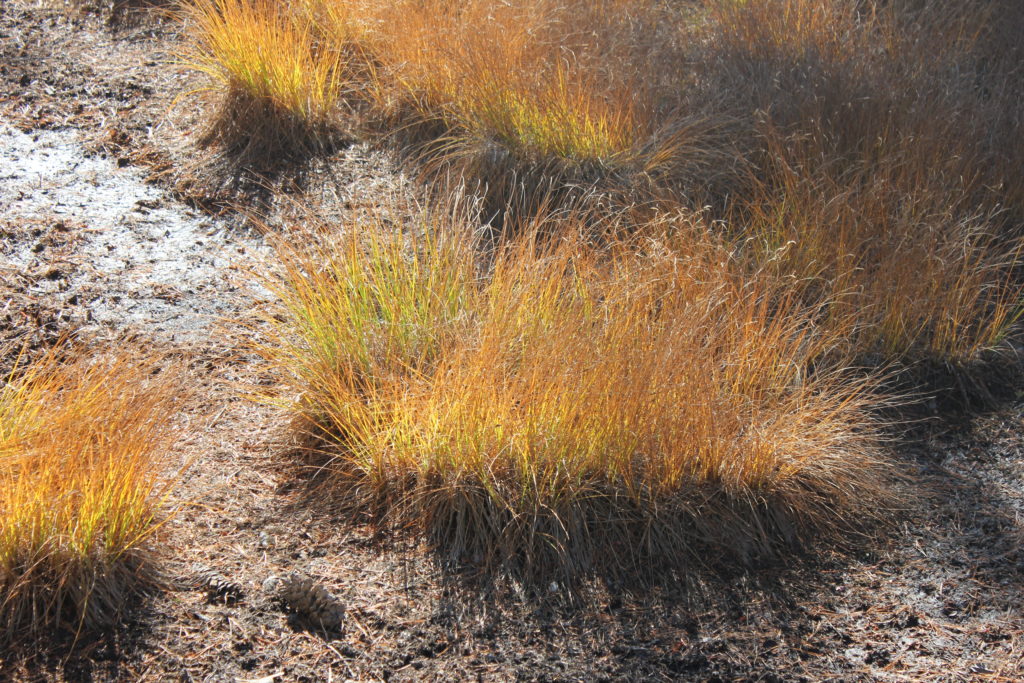
While cleaning up after thoughtless individuals, my own thoughts returned again to the problems facing our planet. I remembered hearing about a precocious Swedish girl, protesting her government’s obtuse inaction on the climate crisis by performing a solo sit-in outside her school, and refusing to attend classes until something changed. That’s what we need, I speculated, the youth of the world has to stand up (or sit down) to demand a response commensurate with the urgency of the situation; to “act like our house is on fire,” as she puts it. Sadly, it’s the kids of today who will face the grim consequences of tomorrow. I prayed for my grandchildren, and pinned my hopes to their brave, innocent hearts. They will have to decide what kind of world they want to live in.
The problem has always been that there are too few people who care to take ownership of the truth. We all read about it, and see it on our screens, but consider it to be somebody else’s problem. Far too many of us choose to ignore the facts of climate change, or pretend it’s not happening, or even wantonly participate in the destruction. The vast majority of people just don’t give a shit. Only a few might care to read someone else’s words, and resonate with the supreme sanctity of our natural world. Others wouldn’t read any books at all – much less one that goes against their obsession to make a profit and be comfortable. The biggest group of all would read and judge these words solely for their entertainment value, and some might feel a momentary sadness, but would soon be distracted by sweeter consumer candy. People nowadays are more interested in what’s happening on their phone screens than the reality of the world around them – the one that makes life (and the Internet) possible. The dwindling attention span of humans is diminishing our collective will to save ourselves from our own destruction!
At this point, it would take nothing less than a massive redesign of the world economy to shift from the current path of consumption and extinction to a course of sustainable, remedial action. Scientists tell us we have 10, maybe 15 years from this point to halt the increase of carbon in our atmosphere, before it has an irreversible impact on all life on earth. One problem with this dire warning is that even if all carbon emissions and other harmful by-products of industrial pillage were to cease immediately, the latent effects on factors contributing to climate change would persist very slowly. Like a large ship, it would take a while to reverse the engines and actually change course, while the momentum continued to bring us closer to the edge. The bigger challenge, however, would be altering human commerce and behavior. The drastic changes necessary to rectify the practice of gang-banging the planet for profit would have a disastrous effect on the things we hold most dear in our lives: mainly our paychecks, bank accounts, investments, and stock markets. We don’t have time to do this slowly, by discussing it in the halls of government or on the screens of social media. Saving the planet (and ourselves) requires bold, decisive action that will cause great pain before healing. Just like flipping a house, there will be a period of intense demolition and unlivable chaos before improvement can emerge.
I’ve thought a long time about this (knowing that I can’t do much about it myself), and I’ve come to the conclusion that the only way to save our planet (and ourselves) is to make ecology profitable. Right now, we are expending incredible amounts of energy, intelligence, and industry on making money from the planet… how about making money for the earth, instead? Humans love to play with money, and are excellent at setting up arcane financial systems such as tax codes, so why not tax those who are destroying the only home we have, and use the revenue to fix it; instead of lining the pockets of more bureaucrats? Start with a flat 20% monthly tax on all corporations, with no loopholes. Companies that pollute the most will be taxed the most… and it increases each month until they change their ways. A citizen’s committee from the local community could decide how much each entity is polluting. If any corporate lawyers complain, they will be ground up for compost… but seriously, one of the best ways to get a human’s attention is with money! The tax code of ecology would allow for deductions based on altruistic contributions to society, or how much the company is changing its ways. Are they helping more, and creating less waste? Reducing carbon emissions? Eliminating the use of toxic chemicals and pesticides? Credits could be given for more positive efforts such as enriching the soil, cleaning water sources, and planting trees. The money generated by this tax would be used for all kinds of habitat renewal and replenishment of natural resources. The oceans might be reseeded and enriched with life again, from the bottom of the food chain upward. More importantly, our collective attitudes and behavior towards ecology would change rapidly, as soon as they are connected to our wallets.

On a more fantastic level, what if all the defense budgets of the world’s nations were directed not at each other, but at collectively fighting the biggest threat to our survival? I get the impression that the biggest military budgets belong to the biggest polluters, anyway, so that would be fair. It’s just this type of drastic change that would be needed – a fundamental shift from destruction to preservation – that makes it entirely unlikely to happen. What are the chances of a general barking out a command for his troops to plant trees, or navy destroyers cleaning all the plastic out of the oceans? Yup. We’re definitely fucked.
One of the drawbacks with any plan, of course, is that plans require money, which by itself is more toxic than all other man-made impurities put together. Wherever large sums of money are dumped, corruption and graft will contaminate worse than an oil spill. That’s human nature – it’s part of our genetic makeup to take advantage of any situation for our own benefit. We can’t rewire 100,000 years of natural selection, but we can redirect our primal avarice from a goal of selfish consumerism to that of conservation and renewal, if we really wanted to. Hell, in America we amended the Constitution to make drinking alcohol illegal, and then repealed it because we didn’t like being sober! During World War II, the entire country galvanized against a common menace, but it will be much harder now, since we ourselves are the threat. As Pogo said, “We have met the enemy, and he is us!” It’s not hard to change, but it’s diabolically difficult to begin. Of course, there will always be scoundrels who try to scam any system, and the shift from consuming and obtaining things to preserving what we have will take an enormous effort, but isn’t our survival as a species worth it?
Another serious impediment would be our so-called leadership. The imposition of a new tax – or indeed, any government mandate that causes financial hardship – is tantamount to political suicide. Unscrupulous politicians will think, “My opponents want to take away the livelihood of my constituents? Then I shall be elected for life!” Not to mention, a new revenue stream would be a great temptation for greedy hogs to line up at the trough. Don’t human beings deserve an organizing system better than the reality shows and beauty contests that pass for politics? The populist notion of “nationalism” is an archaic throwback to our evolutionary past, when tribes stuck together and fought with rivals for territory and resources. It’s hard-wired into our DNA to assist those who look and think like us, and to mistrust strangers and opposing viewpoints. Nothing short of a benevolent, planet-wide coordination of regulating and guiding us through the multiple, convergent crises will save our species. Unfortunately, any societal change on such an unprecedented scale would take generations to achieve, and we have only a few years. Ultimately, humanity’s downfall will be its innate selfishness and inability as a species to work together for the common good. We will argue and fight about how to put out the fire, while the house burns down around us.

Sighing heavily, and weary of trying to solve the world’s problems, I packed up my few belongings and gazed sadly around the campsite, saying farewell to my only real home; wondering when I might return again. It would be tragic to watch the demise of this beloved ecosystem, as the tapestry of Northern California’s forests unravels. I said my goodbyes to the lake and its serendipitous spirits once again, delaying my departure as long as possible, and not wanting to return to the mosh pit of technology. However, I really needed an extra day to prepare for reentry into the turbulence of my atmosphere, and so I simply started walking downhill, knowing every step would bring me closer to civilization. A silly old song echoed in my mind, as I traversed the granite ledges down to the trail. “Sad to say I’m on my way, won’t be back for many a day…” Then as I descended through the forests, a light rain began to fall. Nothing serious mind you, but it boosted my resolve to get back to the car before it might really cut loose! A wet backpack is no fun at all! Alas, it seemed as though every year there was a reason to hurry down this lovely mountainside, when my pack was lighter and I didn’t have to struggle uphill against gravity. I was looking forward to savoring the unique beauty of the trail, and enjoying the forest bathing experience… just not with actual water! There are some interesting side trips available within easy access to the trail, but I hustled past them with nothing more than a quick glance. To save energy, I tried to establish an efficient rhythm with my trekking poles and boots, being careful not to drag my foot where I had repaired the sole with wire. Thankfully, my repair job seemed to be holding up quite well!
One cannot be too careful when hiking alone in wild country. Every footstep has to be quickly targeted, and executed with precision. When looking at the scenery, stop. Then plan where your next footsteps will go before restarting. If taking a picture, or looking through binoculars, find a flat, stable spot. Downhill is more dangerous than uphill, for the simple fact that you place all your weight on a downhill stride. If you make a mistake, your weight is already committed. It’s especially important to watch for loose gravel, or objects that might roll or move when stepped on. This obviously takes a lot longer than prancing through the forest jauntily, head on a swivel and drinking in all the views, but it’s the price you pay for solitude. There’s no one to go get help if you break a leg!
By the time I crossed the bridge and reached the bottom of the trail, the rain had stopped completely, but the weather remained cold and gray. That gave me enough time to load my stuff in the car, change my clothes, and head for home. No sooner was I on the highway, than it began to rain in earnest, and the click-clack of windshield wipers replaced the rhythmic thump-thump of my footfalls. My survival nerves calmed down, as I regained the luxury and convenience of a machine propelled by the energy of other, long-dead animals (not to mention the heater). When I reached the fire-ravaged Dead Zone of Whiskeytown and West Redding, the local radio chatter was full of thankfulness for the first rain of autumn, which heralded the end of fire season. I was appreciative for my excellent timing, coming down the mountain when I did, which made a much nicer end to my adventure than slogging through a downpour with a heavy, wet backpack! Indeed, gratitude was becoming an expanding theme for all my hikes up to the Bear Lakes. Who knows how long my body will be able to make it up there? My left leg and hip were throbbing with a dull ache from the pounding descent, compelling me to wonder what this experience was trying to teach.
I drove past a large group of people cleaning up someone’s burned-down house, loading the charred debris onto a flatbed truck. My immediate impression, from the friendly manner of their bearing, was that they were neighbors from the adjacent homes. It struck me again how, of all the animals on this planet, human beings were the only ones who so willingly gave help to their neighbors, strangers, or even other species. It renewed my optimism that somehow we would find a way to avoid burning down the only home we have. All of the wonderful books, music, and images that humans have created throughout our history inspired me to believe that there is a lesson to be learned for our species, and by doing the hard work with humility and diligence, we will find a way to turn the ship around before it’s too late. Now is the time to encourage and honor humanity for the good it can do, and not dwell on the great harm that has been done. For what child can grow and thrive if he’s always being told what he’s doing wrong?
I drove cautiously on the long highway, understanding with compassion that my lifelong suffering was my own, personal lesson… but for what purpose? Even if I understood what I was supposed to learn, how could my knowledge be applied before it was too late? Caught up in the flow of human travelers trapped in shiny metal cages, the answer arrived intuitively: we are all in this together. Any soul’s improvement assists in the unfolding of the universe, and its return to the all-pervasive love from which it came. No matter how small and insignificant my gains, I’m helping… and that’s all that matters. This refrain of gratitude repeated in my head all the way home, as I replayed the wonderful music of Walela on the stereo.
“Go and pray upon the mountain,
Go and pray beside the ocean,
And you’ll wash your spirit clean.
Be grateful for the struggles,
Be thankful for the lessons,
And you’ll wash your spirit clean.”

